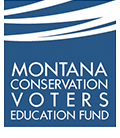FOR IMMEDIATE RELEASE
April 15, 2025
New Report: Federal Land Transfer Would Send Montana Economy Into Tailspin, Increase Montana Tax Burden By $8 Billion
(Helena, Mont.) – A new report released today documents the financial implications of transferring federal public lands to state control as “staggering and disproportionately impactful for a rural state with large swaths of national public lands.” The report by John Tubbs was released in conjunction with a diverse group of public lands advocacy organizations outlines the impacts of a federal land transfer with the staggering analysis that Montana taxpayers could face a conservatively estimated $7.9 billion hit over the next 20 years.’’ John Tubbs has decades of experience in land management at the state and federal level as former DNRC Water Resources Administrator, former Deputy Assistant Secretary for Water and Science, with the U.S. Department of the Interior, and former DNRC Director for Montana.
“As the land transfer movement gains momentum across the West, Montanans should be aware of the staggering financial and economic toll it would take on taxpayers, our state, economy and our way of life,” said John Tubbs, lead author of the report. “This research shows how the land transfer movement would both send our state’s economy into a tailspin by driving up grazing costs 1,600%, harming our $5.4 billion recreation tourism economy and adding a conservatively estimated $8 billion burden on local taxpayers. The impacts would be unsustainable and lead to the inevitable: Montana’s cherished public lands would be sold off to private interests.”
The full report is published in conjunction with the Montana Wildlife Federation, Backcountry Hunters and Anglers, Montana Conservation Voters Education Fund and Mountain Mamas and can be viewed and downloaded on the websites (linked above).
Key figures
The report includes a nearly $8 billion increased state tax burden in Montana over the next two decades not including the direct, secondary and tertiary economic impacts of a federal land transfer on Montana’s $5.4 billion outdoor recreation economy or 1,600% estimated increase in grazing fees for Montana ranchers.
The estimate includes:
- $5.5 billion in wildfire mitigation and response costs;
- $1 billion in costs associated with abandoned mine reclamation and clean up;
- $623 million for deferred maintenance on roads, bridges, campgrounds and infrastructure on federal public lands;
- $40 million annual loss in federal funding for rural schools and local governments through the Payments in Lieu of Taxes (PILT) program;
Background
This report is timely in that the movement to privatize federal public lands is on the rise and is reaching a fever pitch following the 2024 election. Today, the movement is pressing forward at every level of government in the Administration, in Congress and at the state level. It is abundantly clear that special interests see a moment in time to finally enact a federal land transfer scheme as evidenced* by:
- The Trump Administration referring to federal public lands as part of “America’s balance sheet,”
- The Department of Housing and Urban Development and the Interior Secretary Doug Burgum recently announcing plans to sell public lands under the guise of affordable housing projects,
- Rules changes and development proposals are advancing in the U.S. Congress
- State legislative resolutions, including in Montana, that have been introduced in support of Utah’s lands lawsuit aimed at transferring federal lands to the state;
- Republicans in Congress pushing bills that would transfer lands to states or sell off public lands outright.
The report concludes with a sobering assessment of the federal land transfer movement and its significant impacts on Montana.
“The costs associated with maintaining national public lands at the state level—ranging from wildfire operations to the loss of essential federal funding for rural counties—would be far too great for Montana to bear per capita. As a result, Montana would inevitably begin selling off national public lands to private interests, potentially reversing the very principles of public land conservation that have defined the state and the West for generations. The consequences of selling public lands extend far beyond immediate financial concerns and would erode the long-term viability of local economies, conservation and public access for generations to come. A federal land transfer is a nearly $8 billion gamble on Montana’s future.”
More details on the report can be found online here.
Media inquiries may be directed to Kathy Weber: kathycweber@gmail.com,
On behalf of John Tubbs, Montana Wildlife Federation, Backcountry Hunters & Anglers, Montana Conservation Voters Education Fund, Mountain Mamas.
*Sources included in report

